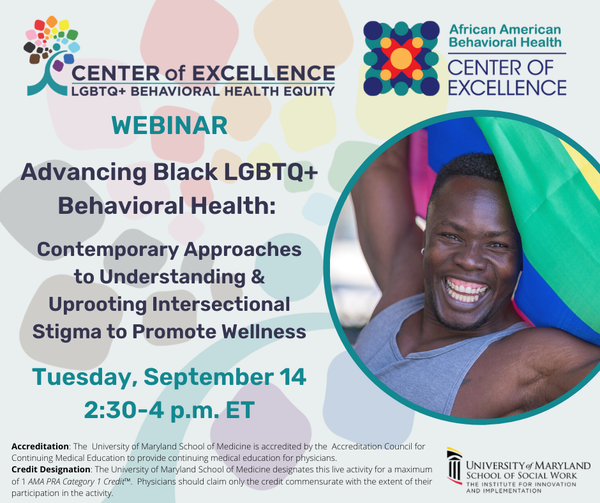
- This event has passed.
Advancing Black LGBTQ+ Behavioral Health: Contemporary Approaches to Understanding and Uprooting Intersectional Stigma to Promote Wellness
September 14, 2021 @ 1:30 pm - 3:00 pm CDT

Center of Excellence on LGBTQ+ Behavioral Health Equity
Accumulating research suggests that multiple, interlocking forms of stigma-related stress (e.g., racism, homophobia, transphobia) drive and maintain behavioral health disparities among Black LGBTQ individuals. Despite this knowledge, most research and clinical interventions related to stigma-related stress focus on one type of stigma (e.g., racism) in isolation from others (e.g., homophobia, transphobia). Intersectionality provides a framework to help researchers and clinicians better understand the multi-dimensional experiences of Black LGBTQ people, but the application of intersectionality to such empirical and clinical efforts remains in its infancy. To address this gap, this webinar includes emerging efforts to better understand and intervene upon links between intersectional stigma and aspects of behavioral health (e.g., mental health, HIV risk) among Black LGBTQ individuals. Delivered by Dr. Skyler Jackson (he/him), this presentation will (a) feature novel experience sampling research illuminating how daily events related to both one’s race and sexual orientation (i.e., intersectional experiences) are associated with day-to-day changes in Black sexual minorities’ psychological well-being and (b) overview recent clinical efforts to develop and test a group-based treatment to address intersectional stigma, mental health, and HIV risk among young gay and bisexual men of color. Future directions, including the applicability of results to clinical, community, and policy-level interventions will be discussed.
Learning Objectives:
- Participants will be able to articulate the framework of intersectionality and distinguish single-axis, additive, and intersectional models of behavioral health.
- Participants will be able to identify the unique forms of stigma-related stress experienced by Black LGBTQ individuals and explain how they relate to select behavioral health outcomes.
- Participants will be equipped to better intervene upon the modifiable psychosocial mechanisms linking stigma, mental health, and HIV risk among Black sexual minority men.
